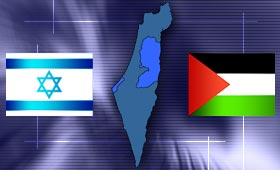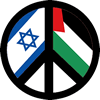
Rationale
Initiated in 2006, this website began as a supplement to the course “Israeli and Palestinian Literatures,” both as a resource of links to a variety of viewpoints on the history and literature of the Israeli and Palestinian peoples, and as an archive of interviews and projects by John Carroll students. It now supports new courses on peacebuilding and postcolonial literature.
The goals: to track the personal and national narratives of these two peoples, whose conflict is neither eternal nor inevitable, and to provide the impetus for readers to be part of a solution to the conflict.
Israeli/Palestinian Literature Course Description
“Israeli/Palestinian Literatures” is a course that illuminates the ways in which Palestinians and Israelis narrate their personal and national stories in literature, staking a claim to a certain way of being and of belonging to the land which they co-inhabit. We will examine these two national narratives through the eyes of the poets and writers with an eye to some of the following questions:
1. How is narration itself—the ability to speak one’s story on one’s behalf—complicated by the problem of war, terrorism or military occupation?
2. How do these narratives frame our understanding not simply of an individual’s subjectivity, but also of a national subjectivity? How have they shifted over time?
3. How do these narratives complicate how “the Arab,” “the Jew,” “the Palestinian,” “the Israeli,” etc., have been represented in U.S. mass media? In other words, what does this literature teach us that American mass media representations have not?
4. What sorts of answers to the present Israeli-Palestinian conflict does this literature provide?
Community Participation
“Israeli and Palestinian Literatures” thrives when local community members participate in our understanding of the conflict by visiting the class or offering to be interviewed by students. If you would like to be a resource, please email me at pmetres@jcu.edu. Thank you in advance for your support. I am particularly interested in people who have direct experience in Israel/Palestine, and those who have participated in dialogue, peacebuilding, and reconciliation efforts. Guests have included Kazim Ali, Ayman Alkayali, Anna Baltzer, Gary Coleman, David Berenson, Nahida Gordon, Marilyn Hacker, Jeff Halper, Jerry Isaak-Shapiro, Ameed Kollab, Lara Kollab, Fady Joudah, Naomi Shihab Nye, David Shutkin and John Spencer. We have visited Agnon School, the Algebra Tea House, the Maltz Museum of Jewish Heritage, attended a Sabeel Conference, and viewed the play “Wrestling Jerusalem.”
Student Final Projects
The following final projects–interviews, media analyses, and creative projects–reflect a diversity of student viewpoints and analyses on representations and narratives of the Israeli/Palestinian conflict. Please note: these projects do not represent the perspectives of the professor; they demonstrate the students’ struggle to make sense of the very different ways in which the story of the conflict is told. As such, as with all the links on this page, readers must consider each piece partial (sometimes in both senses of the term), and must determine their validity themselves.
- Ghassan Kanafani: Palestinian Loss Through the Eyes of the Narrator by Ellen Liebenguth (2016)
- Uncovering the Path to Peace by Erin Kiley (2016)
- Long Distance Relationship: The United States and the Israeli-Palestinian Conflict by Monica Angelotti (2016)
- An Evaluation of “The Lemon Tree” and “Encounter Point” by Kate Finneran (2016)
- The Psychological Effects of War and Violence Experienced by Israelis and Palestinians by Lindsay Mark (2016)
- Two Interviews by Lara Kollab (2013)
- “My Homeland is a Suitcase”: An Interview with Kazim Ali by Julia Blanchard (2012)
- Interview of Debra Hirschberg of Tikkun by Megan Kenny (2009)
- Interview of Deema Shehabi by Liz Castellano (2009)
- The Role of Hip-Hop in the Israeli & Palestinian Conflict by Patience Fiodembo (2008)
-
Analyzing the Framework with Which the Media Mediates by Julie Anderson (2007)
- Interview with Nahida H. Gordon, Ph.D. by Dominic Marchionda (2007)
- Discovering the Accuracy of the US Media through Israeli-Palestinian Blogs by Jenny Friedman (2007)
- Israeli-Palestinian Literature/Media Project by Meghan Wolf (2007)
- To End All Wars: The 2000 Camp David Negotiations by Steve Wessel (2007)
- Interview with Mor by Dan Pirchner (2007)
- An Interview with Jonas Moffatt by Patrick McDermott (2007)
- Interviews with Mike Pramik and Aubrey Smith by Jamie Matty (2007)
- Educating the Future by Colleen Ferron (2007)
- Interview with Amal Amireh by Michael Benisek (2007)
- Interview with Rabbi Rosie Haim by Jessica Sliman (2007)
- Interview with Hamed Hamad by Siobhan Casey (2006)
- Interview with Jerry Isaak-Shapiro by Aubrey Hess (2006)
- Through the Eyes of Ehab: A Narrative of the Arab-Israeli Conflict by Bernadette Naoum (2006)
- Interview with Rahad Shouman by Liz Smietana (2006)
- Reflection and Two Poems by Christopher Kempf (2006)
- Analysis of Four Blogs from Israel/Palestine by Michael Pogachar (2006)
Web Resources
Historical Background:
-
Wikipedia.org: A brief history of the Israeli/Palestinian conflict.
-
BBC: A history of the Israeli/Palestinian conflict with maps.
News, Alternative Media, and other Resources
-
Ha’aretz Daily: A left-leaning Israeli newspaper.
-
The Jerusalem Post: A right-leaning Israeli newspaper.
-
Ynet news: The English version of Israel’s leading online news site.
-
The Palestine Chronicle: An online newspaper that focuses on Palestine.
- Washington Institute: think tank that “seeks to advance a balanced and realistic understanding of American interests in the Middle East and to promote the policies that secure them.”
- MEMRI (Middle East Media Resarch Institute): pro-Israel, right wing think tank.
- MERIP (Middle East Research and Information Project): pro-Palestine, left wing think tank.
-
Tikkun.org: A progressive Jewish-American magazine, founded by Michael Lerner, with a pro-Israel, pro-Palestine platform.
- Mondoweiss: pro-Palestinian blog “from a progressive Jewish perspective.”
-
WRMEA (Washington Report on Middle East Affairs): An alternative media analysis with a pro-Arab viewpoint.
-
Cleveland Jewish News: local newspaper with Jewish perspectives.
- Arab American National Museum: national museum of Arab American history and culture.
- Maltz Museum of Jewish Heritage: local museum of Jewish American history and culture.
Representations & Media Analysis:
-
http://en.wikipedia.org/wiki/Anti-Semitism: The history of virulent hatred against the Jewish people over the centuries.
-
“Planet of the Arabs” video: Shows the Orientalist vilification of Arabs in American movies and television shows.
-
FAIR (Fairness and Accuracy In Reporting): Media analysis with a leftist viewpoint.
Advocacy Organizations
- American Israel Public Affairs Committee: largest pro-Israel lobby in the U.S.
- Christians United for Israel: pro-Zionist Christian organization.
- Anti-Defamation League (ADL): U.S. organization fighting anti-Semitism and bigotry.
- Arab American Anti-Discrimination Committee (ADC): U.S. organization fighting bigotry.
- If Americans Knew: Highlights Palestinian and Israeli issues that are unreported, underreported, or misreported in the American media. Pro-Palestinian.
- Pamela Geller: Right-wing, pro-Israel activist.
Israeli & Palestinian Just Peace/Human Rights Activism:

-
B’TSELEM: The Israeli Information Center for Human Rights in the Occupied Territories
-
Peace Now: A group that focuses on peace between Israel and its neighbors.
-
Breaking the Silence: An organization of discharged Israeli soldiers committed to informing the public of the injustices committed in the Occupied Territories.
-
Jewish Voice for Peace: A progressive community of activists inspired by the Jewish tradition to work together for peace and justice between Israelis and Palestinians.
-
The Electronic Intifada: Publishes news, commentary, analysis, and reference material about the Israeli/Palestinian conflict from a Palestinian point of view.
Literature and the Arts:
-
Israeli Literature: Israeli Literature entry in Wikipedia.
-
Anna in the Middle East: Anna Baltzer’s work with International Women’s Peace Service led to her photographic documentation of life in the occupied territories.